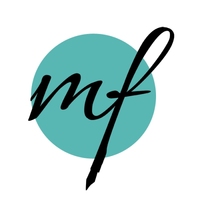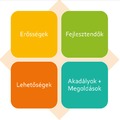Interjú saját magammal :)
Interviewing myself ;)
- Mikor és miért döntöttél úgy, hogy coach leszel?
Nagyon régóta szemezgettem coach képzésekkel, 2015-ben fogalmazódott meg bennem egész konkrétan, hogy szeretném ezt a szakmát megismerni, de tavalyig nem volt erre alkalmam. Szegedi vagyok és nem vagyok mobilis, így csak egy online képzés jöhetett szóba.
- Milyen képzés(eke)t végeztél el? Tervezel még valamilyen (coach, tréner szakmával kapcsolatos) képzés elvégzését?
Első körben csak a life coach képzést néztem ki magamnak, de végül elvégeztem a haladó képzést és a business coach képzést is. Most ismét szemezgetek a tréneri és a team coaching képzésekkel. És egyszer, ha majd sok időm lesz, szeretnék egy olyan posztgraduális képzést is, amelynek a kutatási része releváns, pragmatikus és használható a szakmában is, és azon kívül is.
- Mivel foglalkoztál előtte? Maradtál a pályán vagy a coaching lett a fő hivatásod?
Végzettségem szerint középiskolai angol nyelvtanár vagyok, de sosem tanítottam teljes állásban gimnáziumban, mivel azonnal folytattam a tanulmányaimat PhD szinten, így a tanítás nekem az egyetemen és főiskolán kezdődött. Később gazdasági szakfordító lettem, és több, mint tíz éve dolgozom szabadúszó fordítóként. Emellett mindig is voltak magántanítványaim, és a coaching így is jött, mintegy keretként ahhoz a módszertanhoz, ahogyan mindig is tanítottam.
- Hogyan változott meg az életed amióta elvégezted a coach képzést?
Minden, ami régebben problémát okozott volna, vagy óriási teherként éltem volna meg, mára csak egy átugrandó akadály vagy kihívás.
- Mik a terveid a coach szakmán belül, mit szeretnél elérni?
Az idei évemet a business coaching praxis kiépítésének szentelem, idővel pedig szeretném az üzleti angol nyelvtanítási pilléremet összefűzni a Business Coaching pillérrel, hogy az ügyfelek egy egyedi tudáscsomagot kapjanak, amivel helytállnak a nemzetközi piacon.
- Mi a legnagyobb kihívás számodra a coach szakmán belül?
A legnagyobb kihívás ellenállni annak, hogy okoskodónak tűnjek, vagy olyannak, aki minden életvezetési kihívásra tudja a választ. Attól, hogy valaki jó coach, természetesen maga is küzd az élet kisebb, nagyobb kihívásaival. Csak egyrészt nem pusztul bele ebbe a küzdelembe, másrészt tanul belőle.
- Miben rejlik szerinted a coaching ereje?
A coach társaim már az összes előnyét, erejét említették, én talán azt hangsúlyoznám ki, hogy a legnagyobb az, hogy működik.
- Ha tudod és szeretnéd, oszd meg velünk az eddigi legütősebb sikeredet, amit egy coaching ülésen és/vagy folyamatban értél el!
Ráérezni a másik hangulatára és megtapasztalni, ahogy ráébred a megoldásra hatalmas energia.
- Olyannak, aki még sosem hallott a coachingról, miképpen tudod meghatározni, közelebb hozni a számára?
Vannak, akik életmódnak nevezik, vannak, akik hozzáállásnak, mások pedig módszertannak, szerintem a legjobb kifejezés mégis a gondolkodásmód. A jó coachok az ún. “growth mindsetet” érzik magukénak, amely megoldásfókuszban tartja őket és az ügyfeleket is. Ugyanis, ahogyan azt a mentorunk is sokszor mondta már, ha a problémára koncentrálunk, csak még több problémát generálunk, ha azonban a megoldásra fókuszálunk, az újabb megoldásokhoz vezet.
- Milyen módon lehetne szerinted javítani a coachok széles társadalmi megítélésén?
Edukálni kell az ügyfeleket és a szélesebb közönséget is, mert mint minden nehezen körülhatárolható szakmában, ebben is sok az olyan, aki kárt okoz azzal, hogy fél(re)információkat terjeszt a coaching szakmáról. Véleményem szerint sajnos az sem segít, hogy egyre több olyan coach is van, aki a meglévő szakmák mellé amolyan “adalékként” végez el egy coaching képzést. Összességében ismét csak a mentorunk szavaival tudok élni - csak úgy tudjuk megváltoztatni a közvélekedést, ha jó coachokká válunk és megmutatjuk a coaching erejét.
~
- When and why have you decided to become a coach?
I have been flirting with this profession since 2015, but since I am not exactly mobile, I knew I could only become a coach if somebody finally offered an online life coach course. And this someone was Lily Polgár.
- What kind of training(s) did you complete? Are you planning any other courses or trainings (related to coach and trainer profession)?
Initially I only wanted to complete the Life Coach course, but I was lured into the Advanced and Business Coach courses, too. At this point learning with Lily has become a lifestyle, so I might complete the trainer and/or team coach courses. Eventually I would really like to get a postgraduate degree in a relevant, pragmatic and useful research topic.
- What was your original profession? Have you remained in the field or has coaching become your career?
I am originally a high school ESL/EFL teacher, but I have never thought in a high school, because I went on to continue my studies at a PhD level and therefore gave lectures and seminars at the university. After a few years of teaching I decided to become a sworn translator and interpreter and have been working as a freelance translator for ten more years now. I have always had private students of English and therefore I initially needed life coaching methodology to provide my teaching style a framework.
- How has your life changed since you became a coach?
Everything that used to be a huge problem for me is now only a minor setback or a challenge.
- What are your plans as a coach, what would you like to achieve in the coaching profession?
I would like to build a strong business coaching practice. My aim is to provide coaching sessions in both Hungarian and English, and to intertwine Business English Language and Business Coaching/Training into a unique service providing the clients a compact knowledge and vocabulary needed to thrive on the global market.
- What is the biggest challenge for you in the coaching profession?
The biggest challenge definitely is not to seem a know-it-all. Being a coach does not mean you have the key to all life problems, it merely means that you approach them differently and that you actually consider all new situations an opportunity to learn and grow.
- What is the main benefit / advantage / power of coaching?
I agree with everything all my fellow-coaches have mentioned. In addition, I would only emphasise - its main power is that it really works!
- Tell us about your biggest success as a coach (either in a session, or as an achievement)!
I cannot single out one particular occasion, because it really works best in a process, and the biggest joy is when you can “feel” the client and be able to help them realise what the solution is.
- How would you define coaching to somebody who has never heard of coaching before?
Some people call it a lifestyle, some an approach, some a method, and I would say it is a mindset. I believe all good coaches have a growth mindset which tends to be focused on the solution instead of the problem. As our mentors emphasise, when you think of the problem, you generate more problems, when you think of the solutions, you create more solutions. As simple as that.
- What do you think would be the best way to improve the public perception of coaches?
Both the clients and the wider auditorium need to be educated as to what the coaching profession really entails. Namely, there are still plenty of coaches who do more harm to the profession than they do good with the clients, so the ones to come after them have to correct their mistakes and perform twice as better to be able to eradicate the negative connotations. But as I have referred to our mentor’s words many times, I agree with her in that our job is to be the best coaches we can ever be and prove the power of coaching by doing our job to the best of our knowledge.
https://monikafischercoach.com/
https://www.linkedin.com/in/fischermonika/
https://www.facebook.com/MonikaFischerCoach
https://instagram.com/monikafischer_languagecoach


